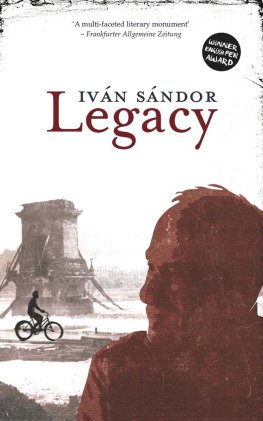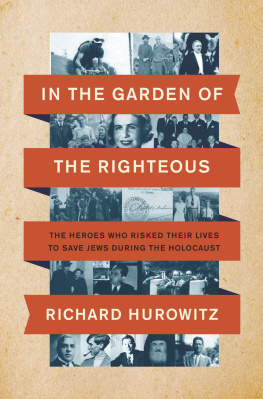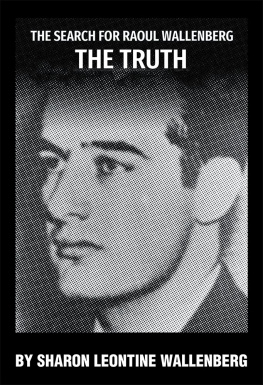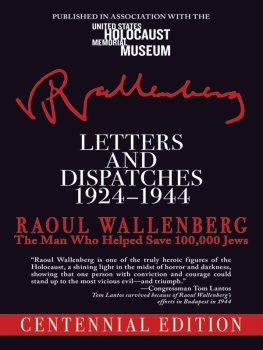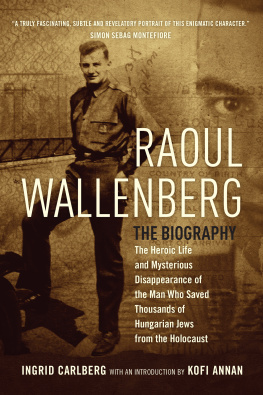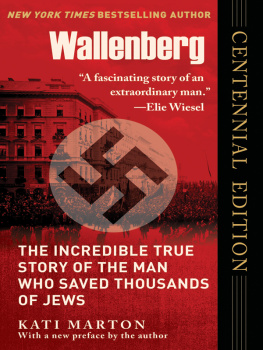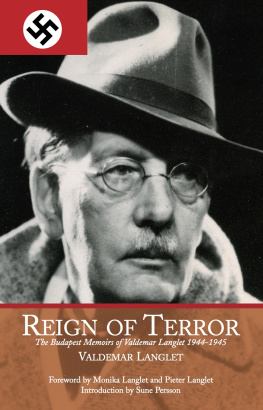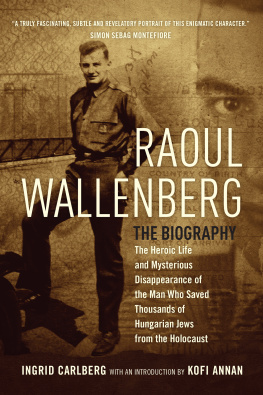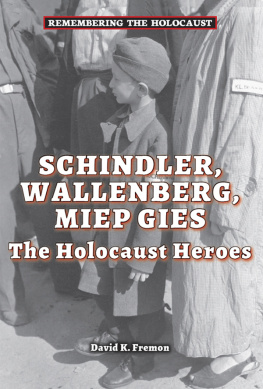John Bierman - Righteous Gentile: The Story of Raoul Wallenberg, Missing Hero of the Holocaust
Here you can read online John Bierman - Righteous Gentile: The Story of Raoul Wallenberg, Missing Hero of the Holocaust full text of the book (entire story) in english for free. Download pdf and epub, get meaning, cover and reviews about this ebook. year: 1981, publisher: Viking Adult, genre: Art / Prose. Description of the work, (preface) as well as reviews are available. Best literature library LitArk.com created for fans of good reading and offers a wide selection of genres:
Romance novel
Science fiction
Adventure
Detective
Science
History
Home and family
Prose
Art
Politics
Computer
Non-fiction
Religion
Business
Children
Humor
Choose a favorite category and find really read worthwhile books. Enjoy immersion in the world of imagination, feel the emotions of the characters or learn something new for yourself, make an fascinating discovery.

- Book:Righteous Gentile: The Story of Raoul Wallenberg, Missing Hero of the Holocaust
- Author:
- Publisher:Viking Adult
- Genre:
- Year:1981
- Rating:5 / 5
- Favourites:Add to favourites
- Your mark:
- 100
- 1
- 2
- 3
- 4
- 5
Righteous Gentile: The Story of Raoul Wallenberg, Missing Hero of the Holocaust: summary, description and annotation
We offer to read an annotation, description, summary or preface (depends on what the author of the book "Righteous Gentile: The Story of Raoul Wallenberg, Missing Hero of the Holocaust" wrote himself). If you haven't found the necessary information about the book — write in the comments, we will try to find it.
John Bierman: author's other books
Who wrote Righteous Gentile: The Story of Raoul Wallenberg, Missing Hero of the Holocaust? Find out the surname, the name of the author of the book and a list of all author's works by series.
Righteous Gentile: The Story of Raoul Wallenberg, Missing Hero of the Holocaust — read online for free the complete book (whole text) full work
Below is the text of the book, divided by pages. System saving the place of the last page read, allows you to conveniently read the book "Righteous Gentile: The Story of Raoul Wallenberg, Missing Hero of the Holocaust" online for free, without having to search again every time where you left off. Put a bookmark, and you can go to the page where you finished reading at any time.
Font size:
Interval:
Bookmark:

The story of Raoul Wallenberg, missing hero of the Holocaust

PENGUIN BOOKS
John Bierman was a journalist and biographer who for twenty-five years covered trouble spots all over the world for major news organizations in Britain, the USA and Canada. For ten years he was a staff correspondent for BBC Television News and the BBC World Service, and spent much of that time in the Middle East, where he discovered the story of Raoul Wallenberg, then virtually unknown. After the Wallenberg book, first published in 1981, he later published ten major biographies, including a book on the French Emperor Napoleon III, the explorer Henry Morton Stanley, and Laszlo Almasy, the real English Patient. He also co-authored two books with journalist Colin Smith, including Alamein, War Without Hate, now available as a Penguin ebook.
John Bierman died in his home in Cyprus in 2006, leaving his wife Hilary and their son Jonathan, and three children from his first marriage.
For Jonathan,
so that
he should know the best there is to know
and the worst.
For those and they must be very few by now who need reminding, Raoul Wallenberg was a pseudo-diplomat who left the safety of neutral Sweden and went to Nazi-dominated Hungary in the summer of 1944 on a seemingly impossible mission. There, he managed, through a combination of courage, determination, guile and cunning, to rescue upwards of 20,000 Jews (some claim as many as 100,000) from the Nazi gas chambers. After that, he was taken prisoner by the advancing Red Army and was swallowed up in Stalins Gulag, never to emerge.
Together with Oskar Schindler, Wallenberg is the best known of that small band of Righteous Gentiles, as the Israelis call them, who stood up to Nazi barbarism and saved significant numbers of Jews from the death camps, thereby demonstrating that lone individuals can, indeed, make a difference.
It would be hard to imagine two individuals more different than Wallenberg and Schindler the Swede quiet, serious and idealistic, the Sudeten German flashy, lecherous and opportunistic. Yet they had one very important attribute in common: a fundamental decency Schindlers Ark (1983) and by Steven Spielbergs memorable film Schindlers List (1993), based on Keneallys book.
In the case of Wallenberg, Righteous Gentile and a television documentary I made on the same subject for the BBC played a similar if somewhat less emphatic role. When I was researching the book and filming the documentary during 197980, Wallenbergs name was virtually unknown, so far as the general public was concerned, outside his native Sweden. I myself had never heard of Wallenberg until, while working as a BBC correspondent in Israel, I chanced across a brief and intriguing reference to him in the Jerusalem Post in the summer of 1979.
The subsequent screening of the BBC film in a number of English-speaking countries in 1980 and the publication of the book in Britain and the United States the following year helped to make Wallenbergs heroic deeds during the Holocaust, and his disappearance into the Soviet prison system, known throughout the world.
A closed-circuit showing of the BBC documentary to members of the US Congress in the spring of 1981 helped persuade an overwhelming majority in both the House of Representatives and the Senate to vote for a bill conferring honorary US citizenship on Wallenberg, the only foreigner apart from Sir Winston Churchill ever to receive it. That measure, signed into law by the newly elected president Ronald Reagan in a ceremony at the White House, had a more than symbolic purpose. Its sponsors hoped it would put some diplomatic muscle behind US efforts to get the Kremlin to disclose the truth about Wallenbergs fate. They wanted to know not just the how, when and why of his purported death in Soviet captivity, but to test the possibility that he might still be alive somewhere in the Gulag, and if so to secure his release.
Compelling evidence led many people including myself to believe it just possible that Wallenberg could have survived three and a half decades of incarceration and that even in the intense Cold War atmosphere of the early 1980s it might be possible to rescue him, in however pitiable a condition, to spend his last years in freedom with friends and family.
Another fifteen years on, it is well-nigh impossible to hold on to that belief. After all, if still alive Wallenberg would be eighty-three, which is some ten years longer than the average life span of Western men, even under comfortable conditions. And the collapse of Soviet Communism, with the emptying of the prison camps and the admission by the Russians of crimes of far greater magnitude than the wrongful imprisonment of one individual, however noble, has failed to produce a clue to his whereabouts.
None the less, a small band of surviving siblings, old friends and colleagues, and younger admirers not only believe but declare their conviction that he has survived and is alive perhaps under an imposed false identity somewhere in the vastness of post-Communist Russia. Their fervour must be respected, even if it cannot be shared. Certainly, this tireless band of true believers deserves support and encouragement in its unremitting efforts to find out exactly what did happen to this remarkable man while in Soviet captivity. For the tantalizing fact remains that, so far, not one scrap of documentary evidence has surfaced to support the Russians official assurances that, regrettably, he died in custody during the bad old Stalinist days. Against this, a formidable body of circumstantial evidence exists to suggest that Wallenberg was alive, somewhere in the Gulag, well into the 1970s and perhaps beyond.
For reasons which remain obscure, the Soviet official file on Wallenberg was destroyed and all that remain, scattered here and there throughout the compendious but poorly organized Kremlin archives, opened to investigators since Gorbachev began the process of liberalization which culminated in the collapse of the Soviet Union, are tantalizing hints and ambiguous references.
In some dusty corner of those archives the definitive document may yet be found which discloses when, where, on whose orders and by what means Raoul Wallenberg, the saviour of so many, met his end. Meanwhile, his fate remains one of the most poignant and disturbing mysteries of the Cold War, just as his deeds during the Holocaust remain among the most inspiring achievements of the World War that preceded it.
Paphos, Cyprus.
June 1995
Early in March 1944, Obersturmbannfhrer Adolf Eichmann was supervising the construction of a hostel for Gestapo officers on a site some fifty miles from Berlin. The work was being carried out by a group of Jews brought in from the model concentration camp at Theresienstadt, and Eichmann, who knew almost nothing of building or construction, had not much to do apart from keeping an overall eye on the work force and ensuring that the Jewish engineers and their labourers performed their task with appropriate zeal.
Eichmann was disgruntled. This was not the kind of work for which he had joined the SS and clambered up through the ranks to achieve the status of lieutenant-colonel in charge of Department IV-B-4 of the Reichssicherheitshauptampt (RSHA), better known as the Gestapo and SD. Nor was it the proper work of his department, which was responsible for Jewish Affairs and Deportation, a euphemism for the concentration, deportation, and extermination of the Jews of occupied Europe and the satellites and allies of the Nazis. That task, however, was virtually completed and life had subsequently lost some of its sparkle for Adolf Eichmann. He had already, with great efficiency and dispatch, cleared as many Jews as could be found alive from Germany and Austria, from France, Belgium, Holland, and all the other countries Germany had overrun, and from the satellite and allied states such as Rumania and Bulgaria. To his chagrin he had been denied access to the areas of most densely concentrated Jewish population under Nazi rule Poland and the occupied areas of the Soviet Union. And now, it seemed, there was nothing fulfilling for him to do.
Font size:
Interval:
Bookmark:
Similar books «Righteous Gentile: The Story of Raoul Wallenberg, Missing Hero of the Holocaust»
Look at similar books to Righteous Gentile: The Story of Raoul Wallenberg, Missing Hero of the Holocaust. We have selected literature similar in name and meaning in the hope of providing readers with more options to find new, interesting, not yet read works.
Discussion, reviews of the book Righteous Gentile: The Story of Raoul Wallenberg, Missing Hero of the Holocaust and just readers' own opinions. Leave your comments, write what you think about the work, its meaning or the main characters. Specify what exactly you liked and what you didn't like, and why you think so.

